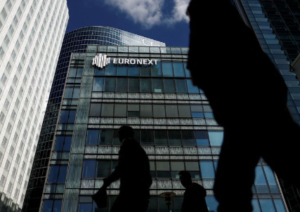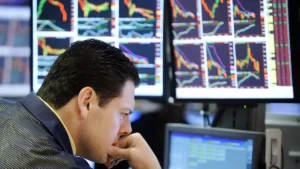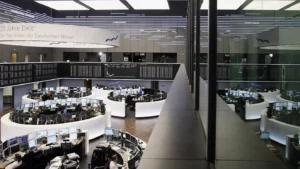As tensions in the Middle East continue to escalate, European markets are bracing for a negative opening on Thursday, reflecting the anxiety gripping investors. The unfolding conflict, particularly Israel’s military actions against Hezbollah, has sent shockwaves through regional and global financial landscapes, prompting a cautious outlook among market participants.
Market Predictions and Investor Sentiment
Pre-market indications suggest a turbulent day ahead for European stocks. The U.K.’s FTSE index is expected to open 38 points lower at 8,252, while Germany’s DAX is projected to decline by 67 points to 19,097. In France, the CAC 40 is set to drop 26 points to 7,545, and Italy’s FTSE MIB may fall 153 points to 33,414, according to data from IG. This anticipated downturn underscores the prevailing investor sentiment, which has shifted toward caution and skepticism in light of the recent geopolitical developments.

The Context of Rising Conflict
The backdrop for this market turmoil is a significant escalation of military actions in the Middle East. Israeli airstrikes have intensified in Beirut, leading to the tragic deaths of at least six civilians. This latest round of violence is part of Israel’s strategy to target Hezbollah, an Iran-backed militant group that has been engaged in hostilities with Israeli forces.
Earlier this week, Iran launched approximately 180 ballistic missiles at Israel, a show of force that heightened tensions across the region. Israeli authorities reported that most of these missiles were intercepted, resulting in no casualties from that offensive. However, the situation remains highly volatile, with the potential for further escalation looming large.
The Economic Fallout
This ongoing conflict has broad implications for the global economy, particularly in terms of energy prices and supply chain disruptions. Investors are wary that any prolonged conflict could lead to rising oil prices, a concern that resonates strongly in an already fragile economic environment.
In addition to geopolitical risks, recent economic indicators from the eurozone add to the complexity of the situation. Data released this week revealed that the unemployment rate in the eurozone held steady at a record-low 6.4% in August. While this suggests a degree of resilience in the labor market, it has done little to alleviate investor anxiety regarding the potential economic fallout from the escalating conflict in the Middle East.
Market Reactions: Mixed Signals
European stocks experienced a mixed close on Wednesday, with investors grappling with the conflicting narratives of geopolitical instability and robust employment data. The uncertainty surrounding the Middle East has overshadowed positive economic signals that might typically bolster market confidence.
The mixed performance reflects a broader trend of cautious trading as market participants assess the potential impacts of geopolitical events on their investment strategies. Many investors are now recalibrating their portfolios in light of rising tensions, looking to safeguard their investments against potential volatility.

Implications for Asian Markets
The situation in Europe is echoed in the Asia-Pacific region, where markets reacted sharply to the evolving geopolitical landscape. Hong Kong stocks plummeted as the initial euphoria surrounding China’s recent stimulus measures dissipated, leading to significant losses. Investors seem to be taking a more cautious approach, reflecting fears of a ripple effect stemming from the Middle East conflict.
Mainland Chinese markets remain closed until October 8, further complicating the investment landscape in the region. Many investors are anxiously awaiting the reopening, eager to gauge the impact of ongoing international developments on local stock performance.
U.S. Market Outlook
As European markets prepare for a negative opening, the mood in the United States is similarly subdued. U.S. stock futures edged lower as investors look ahead to the release of crucial economic data. The weekly initial jobless claims report, scheduled for Thursday, is expected to provide insights into the health of the labor market, while the September payrolls report, due on Friday, will be closely scrutinized for indications of economic resilience.
Market analysts caution that any surprises in these reports could significantly influence investor sentiment and market direction. The dual pressures of geopolitical tensions and domestic economic indicators create a challenging environment for traders and investors alike.
Energy Sector: A Critical Focus
Amidst the geopolitical unrest, the energy sector stands to be particularly affected. Rising tensions in the Middle East often lead to fluctuations in oil prices, which can have far-reaching consequences for global markets. Investors are closely monitoring oil prices, which are often seen as a barometer of geopolitical stability.
Should the conflict escalate further, oil prices could surge, impacting not only energy stocks but also industries reliant on fuel. This concern is magnified by the already precarious state of the global supply chain, which has been under pressure from previous geopolitical events and ongoing economic challenges.
Long-Term Implications for Investors
As European markets brace for a challenging day, the broader implications of escalating tensions in the Middle East cannot be overlooked. Investors must navigate a complex landscape characterized by geopolitical risk, economic uncertainty, and market volatility.
In the face of these challenges, diversification and strategic asset allocation become crucial. Investors may look to hedge against risks by exploring sectors that are less sensitive to geopolitical tensions or that historically perform well during times of uncertainty.
Conclusion: A Cautious Path Forward
In conclusion, the negative outlook for European markets reflects a confluence of geopolitical tensions and economic uncertainty. As the situation in the Middle East continues to evolve, investors are advised to remain vigilant and adaptable in their strategies. The potential for further escalation in the region poses significant risks, not only for local markets but also for the global economy.
The unfolding conflict highlights the interconnectedness of today’s financial markets, where events in one part of the world can reverberate across borders, affecting investments and economic conditions globally. As investors digest these developments, the path forward may be fraught with challenges, necessitating careful consideration and strategic planning in a time of heightened uncertainty.
As we move into the coming days and weeks, all eyes will be on both geopolitical developments and economic indicators that could shape the landscape of European markets and beyond. The ability to respond to these changes with agility and insight will be key for investors navigating this tumultuous environment.

